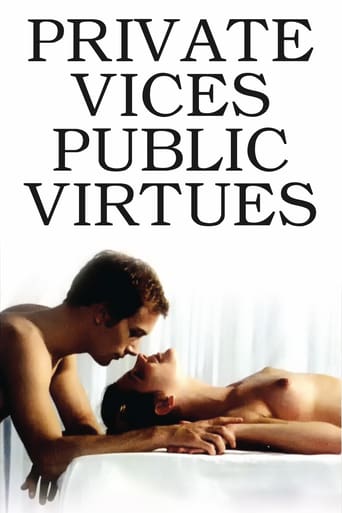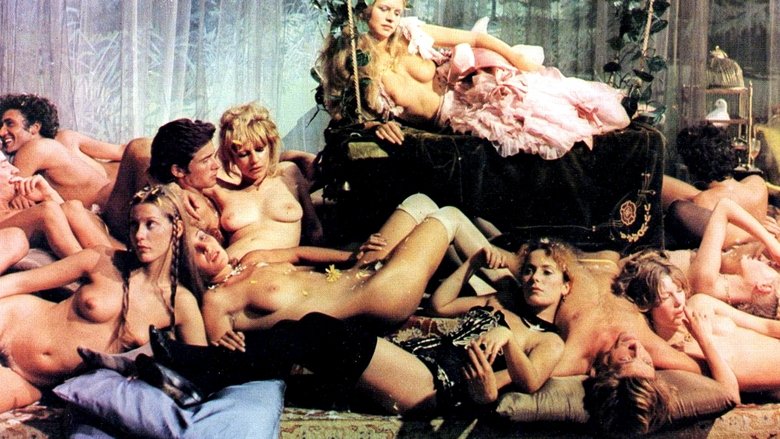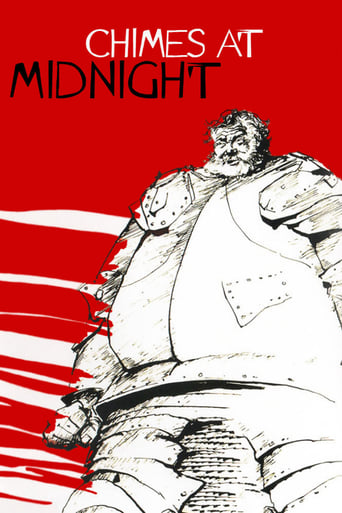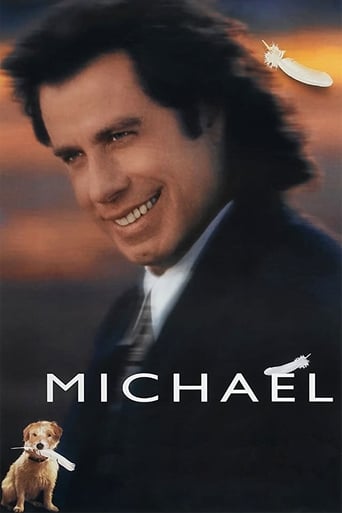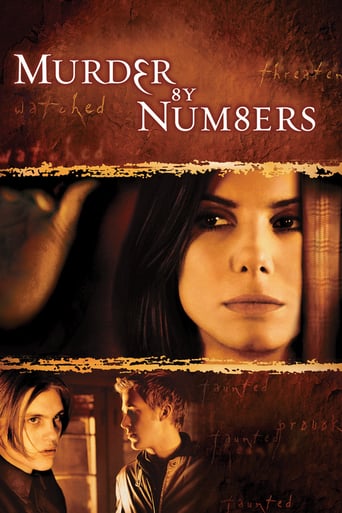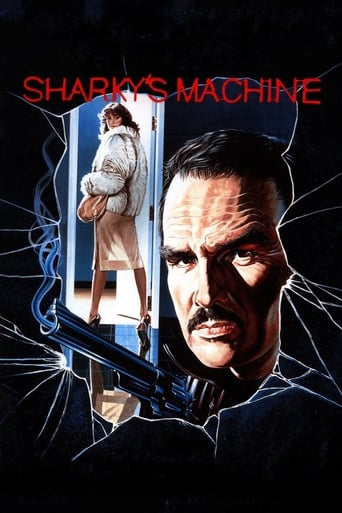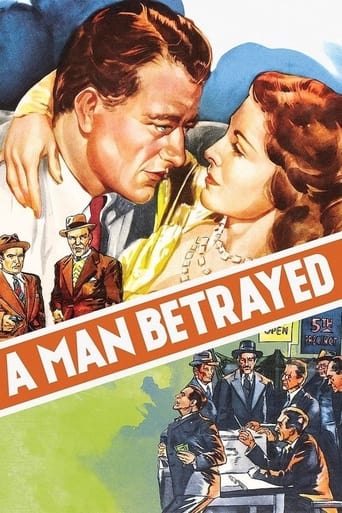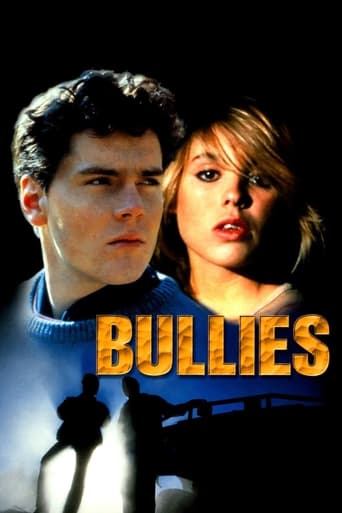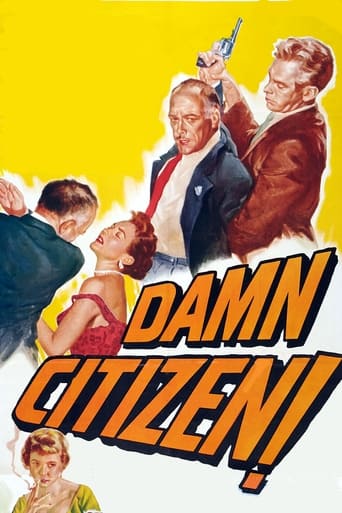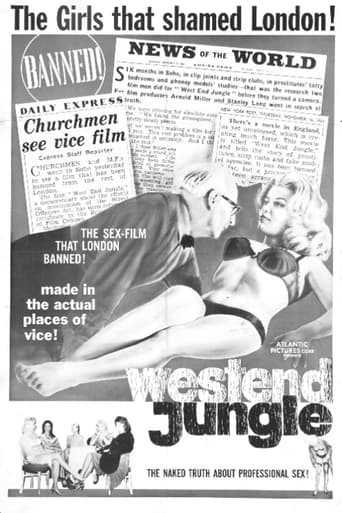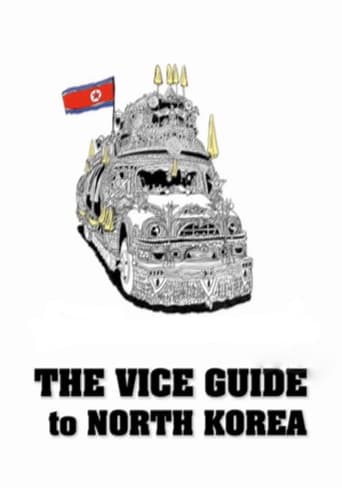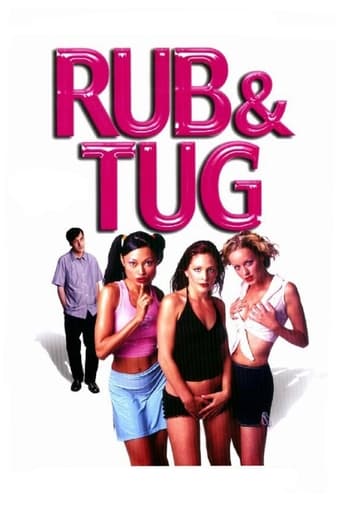Private Vices, Public Virtues (1976)
The setting is a Central European kingdom, near the turn of the century. Bored by his very proper wife, the youthful heir to the throne spends his time in amorous dalliances at a sprawling country estate. His wife departs at the arrival of his friends, and they organize a celebration which becomes a wild orgy and culminates in death and tragedy.
Watch Trailer
Free Trial Channels
Cast


Similar titles
Reviews
I like the storyline of this show,it attract me so much
Purely Joyful Movie!
n my opinion it was a great movie with some interesting elements, even though having some plot holes and the ending probably was just too messy and crammed together, but still fun to watch and not your casual movie that is similar to all other ones.
I enjoyed watching this film and would recommend other to give it a try , (as I am) but this movie, although enjoyable to watch due to the better than average acting fails to add anything new to its storyline that is all too familiar to these types of movies.
A naked guy jumps around his palatial estate. He kisses girls and hugs guys. All the while musicians play something in the background. This takes forever so I started fast-forwarding. He and his crew prepare for some lavish party. Soon after the party begins the clothes start coming off as the guests dance and giggle in a scene that takes forever. As the night progresses inhibitions start falling as well. Some guys in uniform appear and witness the debauchery. The naked guy also wears occasionally a uniform. Next day, more uniformed guys show up to threaten the guy but things don't turn out as they planned.Private Vices, Public Pleasures is absolute junk unless you enjoy ridiculous time-piece musicals mixed with some aberrant sexual stuff. Story-wise there's not much going on. There some tasteless twist about the identity of one of the girls there.As other reviews point out, the characters here are very freely based on historically characters but knowing that doesn't make this movie any better. Even if you're looking for titillation, this movie offers very little except for male genitalia.
A single still of naked revelers taken from this film, which I found in one of my father’s old magazines, had long intrigued me and, having been recently bowled over by Jancso'’s THE ROUND UP (1965), I leapt at the chance of acquiring the utterly barebones Italian DVD edition of it (despite knowing nothing of the quality of the disc itself). Actually, being an Italian production after all, I had wrongly assumed that (as was the case with the director’s other three films shot over there) it would eventually be shown at some point on late night Italian TV; however, in hindsight, its total invisibility for all these years isn’t that surprising. In fact, if I were pressed to pigeon-hole the movie, I’d say that had Walerian Borowczyk ever directed a screenplay co-written by Federico Fellini and Pier Paolo Pasolini, the end result might well have looked something like this. Ever since debuting at Cannes, the film has provoked either outrage or outright dismissals as “pornography with pretensions”; amusingly, in his enjoyable “Stracult” tome, Italian critic Marco Giusti proudly admits to having watched it several times on first release despite its having been confiscated twice by the prudish authorities! Typically for Jancso', there is very little to relate plot-wise: as a matter of fact, this can be seen as simply an erotic fantasia on the infamous Mayerling affair in which the heir to the Austro-Hungarian empire, the Archduke Rudolph, carried out a suicide pact with his mistress. According to Jansco' and his regular Italian screenwriter Giovanna Gagliardo, however, the events were not so clear-cut. Although the film never strays from the Prince’s country estate, Jancso'’s realization of 19th Century Vienna is as visually sumptuous and technically elaborate as expected while the political subtexts as they relate to our modern age are equally important. Although this is the first film I’ve watched myself which dealt with this particular historical incident (there have been countless others over the years, with Anatole Litvak’s 1936, Max Ophuls’ 1940 and Terence Young’s 1968 versions being the best-known), it’s safe to assume that PRIVATE VICES AND PUBLIC VIRTUES is unlike any of them. For starters, most of the film’s running time is devoted to a marathon orgy to which the Archduke invites the younger generation of Austrian aristocrats to spite his father Emperor Franz-Joseph (a mask of whom is donned by several of the revelers). Apparently, a coup to overthrow the monarch had already failed and, consequently, the Archduke retired to his Mayerling estate to live a life of hedonistic abandon. Knowing full well that his family disapproved of his scandalous behavior, he further intends to shock the establishment by photographing the guests in flagrante and sending a copy out to his peers, thus exposing the veiled degeneracy of the ruling class. Ultimately, however, court officials present themselves at the gates of Mayerling to put a stop to the bacchanalian excesses… The three main protagonists of the film are the Archduke, his stepbrother and stepsister who, forming an inseparable and incestuous ménage-a'-trois, are soon joined by an equally libertarian hermaphrodite when a circus troupe stops by the mansion. Having disposed of his boringly proper wife early on, the Archduke falls in love with this newest addition to his inner circle. Left alone after the guests have been dispersed, apprehended or executed (off-screen), the four lovers are ominously shrouded in white sheets like corpses during their final open-air rendezvous: an oppressively melancholy mood makes itself felt towards the end, aided immeasurably by Francesco De Masi’s lovely mournful score. The officials, ostensibly there to put a stop to the offending proceedings and arrest the Archduke, mostly stand around befuddled not knowing how to cope with the extraordinary situation – but their ultimate reaction is swift and abrupt, leading to an inspired slow-motion finale depicting the royal funeral procession.Among the cast list, there were only three names that I recognized: the formidable Laura Betti (who as the loving nanny performs a handjob on her royal charge laying about in the hay!), Theresa Ann Savoy (she plays the crucial role of the hermaphrodite here and would later be equally central to Tinto Brass’ infamous CALIGULA [1979]) and Ilona Staller (adopting the evocative stage name of Cicciolina, she later became a highly popular porn star and, later still, an Italian MP – but, ironically, she is here wasted in the thanklessly chaste bit of the Archduke’s wife!). Although there is much full-frontal nudity involved, the only time it really approaches hardcore territory is the afore-mentioned scene with Betti – unless one wants to count the brief instances of bestiality when some of the guests decide to get it on with a few runaway turkeys!! Typically for Jancso', his characters resort to much communal dancing and game-playing – which is here joined by the improbably effective singing of English childhood ditties (including “Baa-Baa-Black Sheep”)! The sparse original music, then, has been mingled with classical pieces – notably Strauss’ “The Blue Danube” – and, appropriately enough, a handful of military marches.I suppose that, for the uninitiated, all of the above would seem pointlessly perverse and terminally tedious but, stylistically, the film was something of a new departure for Jancso': while the intermittently creative editing (with especially notable use of ellipses) and his trademark long sequence-shots are still in evidence, he reportedly utilized 343 shots here as opposed to the lowly two digit figures of earlier works. On the downside, the video presentation is a bit dodgy at first: an obviously unrestored print has been utilized for the transfer (albeit uncut, as proudly announced on the sleeve of the Italian R2 DVD) but is still acceptable enough for its velvety cinematography and extreme handsomeness to shine nonetheless; the layer change, however, is quite roughly handled (at least by the Pioneer model I watched it on).
This is a fascinating historical film, created by Miklos Jancso - a highly competent director, and it is sad that it has become regarded by some as an essentially erotic work dressed up in the trappings of a historical drama. I find it hard to understand how any viewer who watches it carefully can fail to recognise that the Director was not attempting to create an erotic drama for its own sake (this would have been much easier to do free of the constraints associated with the historical theme), but had what he felt was an important message to convey through his largely fictional story. Remember that the events portrayed in this film have had a major influence on the lives of most of us. The death of Crown Prince Rudolf and his mistress in 1889, was a fundamental link in the chain of events which led to the start of the war of 1914-18, and subsequently to the development of World War II. At the time, these deaths were officially attributed by the Hapsburg government to a suicide pact which followed their recognition that the couple would never be able to marry; but right from the start many commentators (both nationally and internationally) suggested that foul play was a more probable explanation. The full story was exceedingly complex and had more twists than most detective novels, but there can be no doubt that the Hapsburg authorities attempted to conceal many of these facts, adding fuel to speculations that the Emperor himself may have been involved in some sort of plot designed to end Rudolf's illicit liaison with his mistress, Baroness Maria Vetsera. This is the story line followed in the film which suggests that Rudolf was attempting to force Franz Joseph to abdicate by gaining the support of the Austrian society of the time for a more liberal social order; and that Franz Joseph either planned or condoned the assassination of the couple in order to avoid their licentious activities continuing to embarrass the Imperial Court. I believe it is intrinsically unlikely that Franz-Joseph would have ever contemplated the assassination of his son, the heir to the Hapsburg throne, however acutely he had been embarrassed by his behaviour. After more than six centuries of continuous rule by the same family, the Hapsburg dynasty was almost unique; and throughout Franz Joseph's long life devotion to the continuation of this dynasty had been the major driving force for most of his activities. He had little respect for his brothers son, through whom the succession would pass, and it is recorded that he never once spoke to the great nephew who was his eventual successor during the remaining 27 years of his rule. He must have been aware that his death would constitute a major crisis which the empire itself might not survive; and it is hard to believe that, whatever the provocation, he would deliberately have done anything to create such a crisis. There are at least two other more credible explanations for the assassination of Crown Prince Rudolf. Over the centuries the Hapsburg empire had expanded, more by marriage than by conquest, until it incorporated a vast array of diverse ethnic groups which became difficult to hold together after the Napoleonic wars released their tide of libertarianism and nationalism. One revolt in Hungary was suppressed, but the Empress persuaded her husband to make a very conciliatory settlement with the Hungarians in 1867 which effectively created what became known as the joint Austro-Hungarian Empire. Rudolf was also strongly supportive of Hungarian aspirations, and this antagonised many members of the Imperial old school. Some of them may well have decided to take steps to ensure that Rudolf would never succeed Franz-Joseph as Emperor. An alternative explanation for his death is supported by near deathbed testimony from Countess Zita, the wife of Emperor Karl, Franz Joseph's eventual successor who inherited the imperial throne in 1916, following the assassination of his uncle in Sarajevo in 1914 and the death of the old Emperor during the resulting world war. Empress Zita lived to the age of almost 90, dying in 1989 fourteen years after this film was produced. Before her death she recorded accounts of Hapsburg family conversations which suggested that Rudolf's death followed an approach from French authorities seeking to gain his support for an attempt to persuade Franz Joseph to abdicate so that Rudolph could introduce a more liberal regime which internationally would support the French rather than Germany. Rudolf had indignantly rejected this proposition and reported it to his father. His assassination at Meyerling followed - presumably by French agents or their Austrian sympathisers. Her account was largely ignored at the time it was first published, but three years after her death (and several years after this film was released)it was supported by late autopsies of the bodies of the two victims which showed that, contrary to the official accounts, Baroness Vetsera had not been shot but had been battered to death, and that Rudolf had fired six shots from his revolver before he died. It is interesting to speculate how this new information might have changed the message Jancso was attempting to pass on, if it had been available when the film was produced. We are now never likely to know what actually happened; but if, like me, you do not believe Franz Joseph was directly responsible for the death of his son, you can still enjoy this film and its message that the old order will eventually have to yield to the pressures created by a younger and more virile generation. It is an important film which should be made available as a DVD, but be aware that whilst the Rudolf of the film is just a libertine who is something of a caricature, the historical Crown Prince appears to have been a well travelled, cultivated individual with remarkably progressive views who was highly regarded by most of those that had anything to do with him.
This is an excellent film, with an unfortunate and misguided bad reputation. Partly because Jancso antagonised the critics by including explicit (for its time) sex when they had been used to more "political" content. Jancso used the sexuality in his film to point out that we live in a repressive society and showed that the characters in his film were willing, up until the point of death, to live out their free attitudes towards sexuality. This was and still is a subversive issue as sexuality still seems to need some dismal excuse for inclusion in non-pornographic films. In this film Jancso was bold enough to present eroticism within a deliberately anarchic context. Contrary to other readers comments this film is neither boring nor rubbish. The fact also that it has homosexual imagery disturbs a lot of narrow minded viewers, but there again Jancso showed these images to represent a multi-sexual utopia. This utopia of course in the film had to be destroyed. You can't get more political than that.

